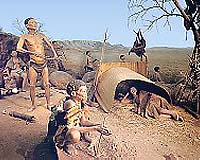| . |  |
. |
Boston (UPI) Jul 2, 2010 Genes can accurately predict how long a person will live, and they may provide clues to treat or prevent age-related diseases, a study says. The study at Boston University identified a small set of DNA variations called genetic markers that can predict "exceptional longevity" with 77 percent accuracy, the Los Angeles Times reported Friday. There's no one single "longevity gene," the study published in the journal Science said, but rather a cumulative effect of almost 150 markers, and different people show different markers. "The study shows that there are different paths to becoming a centenarian," BU graduate student and co-author Nadia Solovieff said. "People age in different ways." Genes are not the whole story, the study said. For most people, environment and lifestyle play equally important roles in aging. Research on the genetic markers could be used to develop drugs for age-related diseases such as heart disease, diabetes and Alzheimer's, which occur at much lower rates in centenarians, the study suggests. Centenarians, people 100 or older, account for about one out of every 6,000 people in the United States, where the average life expectancy is about 78 years,. "It's kind of like winning the lottery," study co-author Dr. Thomas Perls said.
Share This Article With Planet Earth
Related Links All About Human Beings and How We Got To Be Here
 Man-Made Global Warming Started With Ancient Hunters
Man-Made Global Warming Started With Ancient HuntersWashington DC (SPX) Jul 02, 2010 Even before the dawn of agriculture, people may have caused the planet to warm up, a new study suggests. Mammoths used to roam modern-day Russia and North America, but are now extinct-and there's evidence that around 15,000 years ago, early hunters had a hand in wiping them out. A new study, accepted for publication in Geophysical Research Letters, a journal of the American Geophysical Uni ... read more |
|
| The content herein, unless otherwise known to be public domain, are Copyright 1995-2010 - SpaceDaily. AFP and UPI Wire Stories are copyright Agence France-Presse and United Press International. ESA Portal Reports are copyright European Space Agency. All NASA sourced material is public domain. Additional copyrights may apply in whole or part to other bona fide parties. Advertising does not imply endorsement,agreement or approval of any opinions, statements or information provided by SpaceDaily on any Web page published or hosted by SpaceDaily. Privacy Statement |